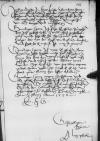Letter #4564
Mathias PLATEN to Ioannes DANTISCUSGdańsk (Danzig), 1538-03-07
| received 1538-03-10 Manuscript sources:
| ||||
Text & apparatus & commentaryPlain textText & commentaryText & apparatus
Dem hochwirdigst(en) in Got fursten(n) unde hernn, / hern
Hochwyrdigster in Gott Furste, Genediger Herre, /
Ewer Ffurstlichenn(n) Genoden seynth meyne ghehorszame unde vorphlichtig(e), wyllig(e), stethe dÿnste alle weg(en) noch meynem hogesten vormog(en) zcuvorann(n) bereytt unde enthpholenn(n).
Genediger Herre.
Ich fuge E(wer) Ff(urstlichen) G(enoden) zcu wyssze(n), das ich gekofft habe II tonne(n) her(en) geczy(r)ckelt or geczy(l)ckelt⌈geczy(r)ckeltgeczy(r)ckelt or geczy(l)ckelt⌉ guth unde schyck(e) szy bey Scime(n) Pale, bey zceger, der myr den bryff von E(wer) Ff(urstlichen) G(enoden) brocht(e). Unde steytt dy t(onne) = Ꝟ m(ark), ist = IX m(ark) gros.
Genediger Herre, ich wes E(wer) Ff(urstlichen) G(enoden) newe zceytunge dyssze zceytt nicht zcu schreybenn(n), denne das das byr wyrth trefflich vyll ausszgeschifft / unde wyrth off den so(m)mer towr warden. Szo E(wer) Ff(urstlichen) G(enoden) vor das glas etczwas guttes haben wyll, / szo magk E(wer) Ff(urstlichen) G(enoden) vor Oster(n) gutt marczbyr losszen bestellenn(n).
Genediger Herre,
Dat(um)
E(wer) F(urstlichen) G(enoden) guthwylliger dÿner


 AAWO, AB, D.5, f. 142v
AAWO, AB, D.5, f. 142v